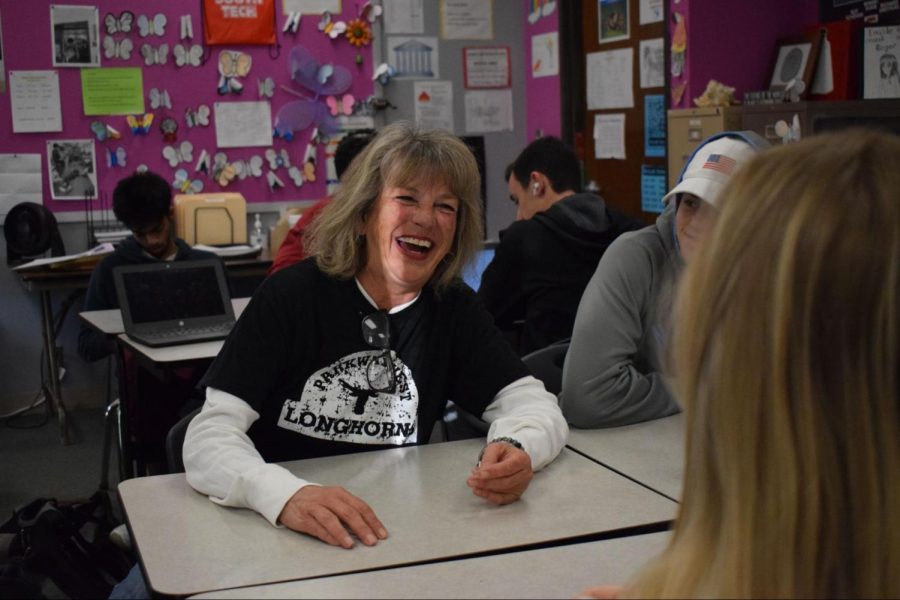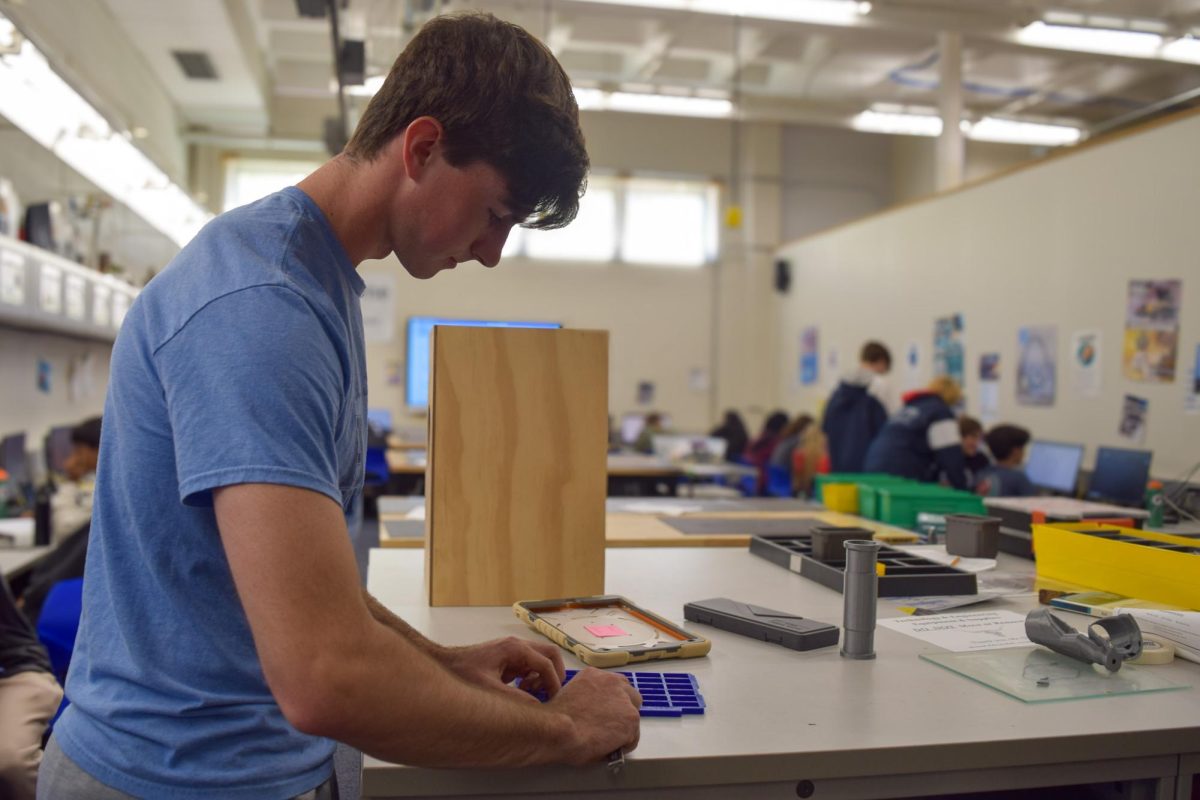English teacher Angela Frye expected to pay over 70K in student loan debt to the federal government. Since Feb. 15, Frye has been forgiven of her debt by the U.S. Department of Education and the federal government. Frye is among less than one percent of teachers nationwide to be forgiven. Nearly half of educators nationwide have accumulated student debt. This amount of debt is not uncommon, over 30% of educators owe over $65,000. Student debt loans for educators often exceed the median salary of $62,870.
Frye earned a Bachelor of Arts in Education from the University of Missouri St. Louis (UMSL), a Master of Arts in Educational Leadership from Saint. Louis University (SLU) and a Doctorate in Education from Maryville University.
“[Undergrad] was a cool experience, [but] I was still curious and ready to learn. I knew how expensive it was going to be. I always knew that. I thought it would be a part of my life,” Frye said.
Frye’s family did not expect her to go to college; it was never discussed. Moreover, no one in her immediate or extended family attended college at the time.
“I just knew that I wanted to be a teacher, and to be a teacher, you have to go to college. So it was a big deal if someone in my family went to college. But, I also wanted to show that there was something more to me,” Frye said.
As an educator, Frye was simply aware of this program as an option. The Human Resources department through Parkway sent an email reminder to teachers to apply for the program. The loan forgiveness programs and the Federal government work together on forgiving loans. This made the process easy for Frye, as they had access to all of her information prior to her application.
“It [the application process] was frighteningly easy. I had to fill out something very simple: a simple sheet of paper, [indcluding] my name, no big financial information whatsoever. It was freakishly quick [for them to get back to me] too,” Frye said.
The U.S. Department of Education announced its revisions to the debt forgiveness qualifications Oct. 6, 2021. Previously, they had stricter requirements around what area you lived in, how many years you were teaching and how many consecutive years you had consistently paid the loans back. When Frye initially applied, she was rejected three times. When she applied a fourth time, she was finally accepted.
“I hoped for it, but it’s not like I would have quit my job. I kept trying because I love my job. [I had] a ‘give it a shot’ kind of mindset. I had to at least try for sure. Some magical algorithm plugged in my information, and all of a sudden, this time it worked,” Frye said.
When she was accepted it was a big surprise. Frye had accepted that she would be paying the loans through retirement.
“I figured it was worth a shot. [Once I was forgiven,] It was the first thing I thought about when I woke up. It was the last thing on my mind when I went to bed. I was like, I can’t believe this. Is this really happening? It’s unbelievable,” Frye said.
Before West, Frye taught English at Pacific Highschool throughout her career. Then, she transitioned to Holman Middle School, where she was an English teacher for eight years, then to South Middle School, where she was an assistant principal for 11 years. Moving forward, her forgiveness of the loans will not change her career or lifestyle.
“Of those schools, it’s no joke West is best. It really is. I love my job. I work at a great school. I have a wonderful group of friends and wonderful family members. So I’ve already felt grateful every day. This just puts the cherry on top. I feel like a winner. This doesn’t mean I’m gonna go buy a new car or something ridiculous like that. It just means that when I retire, I don’t have to worry about those loans,” Frye said.
Aside from Frye’s forgiveness, she wants students to put more thought into their careers and would like to see educators have their loans forgiven more easily.
“I am passionate about education. But students and parents need to understand that a college degree is not a guarantee to a fulfilling job and happiness. I hate the thought of so many young people starting life with debt,” Frye said. “What is unique about educators is that we do not make a lot of money. Educators know this, but we love students and the job, and it takes a long time to increase our salaries. Educators are public servants, and we have a lot of responsibility,” Frye said.
But, ultimately, she feels a sense of relief, knowing care and effort over the years are being returned to her in the form of financial forgiveness.
“I am beyond grateful that I finally fit some magical algorithm. It just makes my heart warm, all that hard work. I do believe in karma. I give out good energy. It just made me feel good. Like, ‘Oh, I did a good thing for all these years, and I’m finally getting the energy back.’ It was just an unbelievable gesture,” Frye said.





![Gazing across the stage, sophomore Alexis Monteleone performs in the school theater. The Monteleone family’s band “Monte and the Machine” has been releasing music since 2012, but Alexis started her own solo career in 2024 with the release of her first single, Crying Skies. “My whole family is very musical, [and I especially] love writing [songs with them],” Monteleone said.](https://pwestpathfinder.com/wp-content/uploads/2025/09/DSC7463-1200x798.jpg)
![Amid teaching a lesson to her AP Calculus BC class, Kristin Judd jokes alongside her students in their funny remarks. Judd has always enjoyed keeping the mood light in her classroom, along with on the volleyball court. “[I enjoy] that side talk where you see [or] overhear a conversation and chime in, or somebody says something funny,” Judd said.](https://pwestpathfinder.com/wp-content/uploads/2025/09/image-1200x730.jpg)
![Eyeing the ball, junior Ella McNeal poses for her commitment pictures at Clemson University. McNeal’s commitment comes after months of contact with top Division 1 soccer programs. “ It has taken a lot to get to where I am, but I know that [what] I've already been through is just the beginning, and I can't wait for what is to come,” McNeal said.](https://pwestpathfinder.com/wp-content/uploads/2025/09/IMG_4926-1200x900.jpeg)


![Senior Adam Zerega stands with senior Dexter Brooks by farm equipment. Zerega often worked with friends and family on his farm. “I've been able to go to my family's farm since I was born. I [spend] at least three weekends a month [on the farm], so I'm there all the time,” Zerega said.](https://pwestpathfinder.com/wp-content/uploads/2025/04/IMG_4872-1200x900.jpg)

![Phage grown by senior Rio Naghibi Harat sit in petri dishes. Through Webster University, Naghibi Harat was given the opportunity to develop phage as a potential remedy for tuberculosis. “Phage are everywhere. I got mine from a soil sample. I'm not kidding; I picked [it] up from dirt. They're harmless, unless you code them to do something, and they can evolve. Virus antibiotics can't. They're one solid molecule. A strain of this bacteria [can evolve] that is resistant to [a] particular drug, [but] phage will evolve with the bacteria. They can see the changes, and they can be the change,” Naghibi Harat said.](https://pwestpathfinder.com/wp-content/uploads/2025/04/Flag-2.png)
![Hosting a meeting for Women’s History Month, co-president Bethany Liao converses with club members of Women in Healthcare. The event fostered discussions about women in medicine and included a third year medical student from Bosnia as a guest speaker. “Creating this club has been a net positive experience for everyone. After we present [or a guest speaker], we [also] usually have snacks for everyone and it gives people an opportunity to generally talk or discuss,” Liao said.](https://pwestpathfinder.com/wp-content/uploads/2025/04/DSC0032-1-1200x800.jpg)

Serena Liu • May 19, 2022 at 7:14 am
great story Sapir!!!